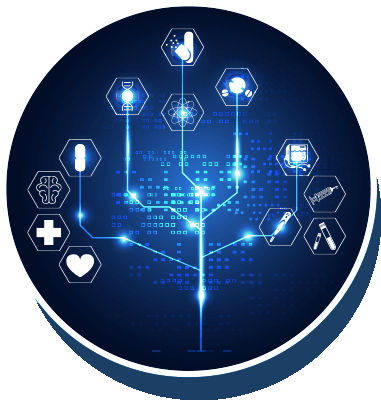Workshop
Milano, Italy
Auditorium Testori, Palazzo Lombardia
September 23rd-24th, 2019
Big Data,
Electronic Health Records and Health Governance


After the successful conference held in May, we are glad to invite you to the workshop titled “Big Data, electronic health records and health governance”.
The aim of the Workshop is to explore one of the key thematic areas of the Regions4Permed project, which is understanding how big data and digitalisation can support measures to promote health, as well as to reform health systems, easing the transition to new patient-centred care models, and to new integrated care structures.
We will be discussing the potential, the risks and role that Regions can play in the governance process of health data, focusing in particular on the current state of art and the next challenges.
In the Workshop in September we are planning to discuss the topic of Data and health governance with Policy Makers, Representatives of Universities and Research Hospitals, Organisations active in the field of Healthcare from different Regions. The Workshop, structured in parallel sessions, will focus on four areas: 1) Data integration and interoperability, 2) Public and private investments and Public-private partnerships 3) Change management in hospitals (including IT training for doctors, monitoring and management of chronicity) 4) Data Access (to researchers, clinicians and patients).
We would like representatives of Regions, Countries, Healthcare Organizations to present and discuss their policies and practices in their Regions/institutions.
The agenda will be constantly updated on this page
Programme
Day 1, 23rd September 2019
9:00
Registration and Coffee
10:00
Host Greetings:
- Marina Gerini, Fondazione Regionale per la Ricerca Biomedica
- Regione Lombardia
10:30
Regions4permed: aims of the workshop
Gianni D’Errico, Fondazione Toscana Life Science, Project Coordinator
11:00
The value of Data and the political responsibility to use it
Peter Kapitein, Inspire2live
11:30
Value of Information analysis (VOI)
Enrico Capobianco, University of Miami Center for Computational Science
12:00
Data Sharing and trust: the Estonian case
Neeme Tõnisson, Estonian Genome Center
12:45
Lunch Break
13:45 - 15:30
Parallel Sessions
13:45 - 15:30
Auditorium TESTORI – Policy area 1
Data integration and interoperability
Health data are often organised in large datasets. These sets are often fragmented, and the level of interoperability is currently extremely low. Therefore, part of the challenge is to identify pathways towards a better data integration, in order to better address common health concerns in the future. The organisation, interoperability and valorisation of health data represent a keystone for healthcare sustainability in the long run.
Topics to be discussed:
- Infrastructural (technology enabling) interventions;
- Data organisation (eHR and biobanks) and healthcare systems interoperability;
- Ethical issues related to usability;
- Privacy and legal interventions to ensure data security and general public acceptance of health data utilization.
Best practices will be presented.
CHAIR: Thomas Neumuth, Regions4Permed AB Member, Germany
RAPPORTEUR: Stefania Boccia, Luca Giraldi, Università Cattolica del Sacro Cuore, Italy
SPEAKER: Luca Augello/John Mason, ARIA (Azienda Regionale per l’Innovazione e gli Acquisti), Italy
SPEAKER: Alonso Sanchez, Navarra Biomed, Spain
SPEAKER: Claudia Pagliari, University of Edinburgh, UK
Room 34 Arancione (Orange), N4 building, 2nd Floor
Policy area 2: Investments on big data infrastructures
Investments on big data infrastructures
Significant healthcare improvements can be achieved when data-based innovations are applied to the healthcare system. Regions can support this process through international collaborations and partnerships, identifying needs and common values. Clear goals need to be set within public-private networks to create models of best-practice. This will trigger a shift in the current state of art, encouraging more local relations, cooperation, and collaborations that will facilitate the uptake of innovative healthcare.
Topics to be discussed:
- Public investments at regional level;
- Structural funds | S3 Platforms and interregional investments;
- Private investments to support multiregional investment pipelines;
- Public-private-partnerships
Best practices will be presented.
CHAIR: Riccardo Colombo, BioRep, Lombardy Life Sciences Cluster, Italy
RAPPORTEUR: Maurits-Jan Prinz, European Federation of Pharmaceutical Industries and Associations (EFPIA)
SPEAKER: Margot Jehle, Codex4SME
SPEAKER: Michel Van Speybroeck, Janssen Pharmaceutica NV, Harmony Project, Belgium
SPEAKER: Sabato Mellone, University of Bologna, Italy
15:30
Coffee Break
16:00 - 17:45
Auditorium TESTORI – Policy area 3
Healthcare organisations in a changing environment
The implementation and use of integrated data science offers healthcare organizations the opportunity to: i) combine traditional (clinical) datasets, including data from the electronic health record, with emerging big data sources, ii) enable better patient management, as well as implementation of continuous patient monitoring and real-time laboratory results. Platforms can enable cost-effective and scalable analytics for the information as key to comprehensive access to health care.
Topics to be discussed:
- New models for earlier “taking care approach” (enabling prevention and prediction approaches)
- Continuity of care and management of chronicity
- Healthcare budgeting reimbursement models;
- Healthcare staff and the Challenges of data integration in hospitals and general medical care;
Best practices will be presented.
CHAIR: Elio Borgonovi, Regions4Permed AB Member, Italy
RAPPORTEUR: Pritesh Mistry, Royal College of General Practitioners, UK
SPEAKER: Luís Velez Lapão, Global Health and Tropical Medicine, Universidade Nova de Lisboa, Lisboa, Portugal
SPEAKER: Guido Grignaffini, ASST Vimercate; Luca Merlino, Regione Lombardia, Italy
SPEAKER: Robin Weidemann, University Hospital Carl Gustav Carus Dresden
Room 34 Arancione (Orange), N4 building, 2nd Floor
Policy area 4: Promoting access to data
Promoting access to data
Access to health related data either regionally, nationally and cross-border in a secure way and in full compliance with the ethical and legal principles, improves life for citizens and helps innovators find the next generation of digital solutions and medical treatments. Whilst the EU is setting strategies to support eHealth digital services, Regions can accelerate its implementation.
Topics to be discussed:
- Access to data for researchers to advance clinical research;
- Access to data for innovators for new and improved solutions;
- Access to data for citizens to improve self-management, as a new form of patients engagement
Best practices will be presented.
CHAIR: Riccardo Bellazzi, University of Pavia, Italy
RAPPORTEUR: Birute Tumiene, Vilnius University Hospital Santaros Clinics, Lithuania
SPEAKER: Antonio Barone, ARIA (Azienda Regionale per l’Innovazione e gli Acquisti), Italy
SPEAKER: Torsten Leddig, Greifswald University, Germany
SPEAKER: Francesca Sofia, Epilepsy Alliance Europe
17:45 - 18:15
Wrap up of the day and presentation of day 2
FRRB, TLS
18:15 -19:30
Reception
Day 2, 24th September 2019
Auditorium Testori
9:00
Welcome coffee
9:30
Report from the parallel sessions
Moderator: Denis Horgan, European Alliance for Personalised Medicine
10:30
Capacity Building
Best Practice 1. A regional example: Regione Emilia Romagna
Sabato Mellone, University of Bologna- Regione Emilia Romagna
Best Practice 2. An Interregional Collaboration: 4 Motors of Europe
Luigi Cajazzo, Lombardia
Daniel Buhr, Baden-Württemberg,
Josuè Sallent Ribes, Catalunya
Auvergne-Rhône-Alpes
Best Practice3. A European Network EUREGHA Network
Valentina Polylas, Euregha
12:45
Wrap up of the Workshop
13:00
LUNCH BREAK & CLOSURE OF THE MEETING
14:00-15.30
CLOSED EVENT: CO-CREATION MEETING
14:00
Closed event for Interregional Committee, PerMed Hub and Partners: Co-Creation Meeting
15:30
End of the Co-creation Meeting

